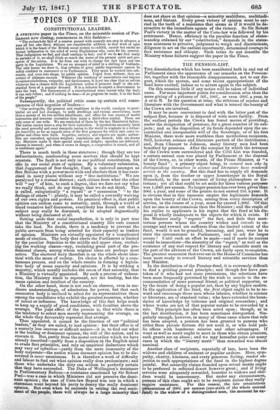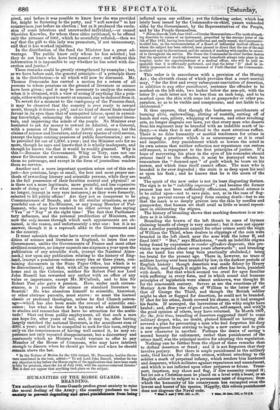THE PENSION-LIST.
THE dissatisfaction which has been manifested both in and out of Parliament since the appearance of our remarks on the Pension- list, together with the reasonable disappointment, not to say dis- gust, which the system, and some recent appropriations of the fund have excited, induce us to advert again to the subject. On this occasion little if any notice will be taken of individual cases. Far more important points for consideration arise than the mere giving of a pittance of 50/., 1001., or even 2001. a year, to A or to B. In the question at issue, the relations of science and literature with the Government and what is termed the bounty Of the Crown are involved.
It may be more convenient to deal with the latter part of the subject first, because it is disposed of with more facility. From the earliest periods the Crown has found means of providing, under the designation of pensions, for a great number of its sub- jects; - and as the disposition of its funds depended upon the un- controlled and irresponsible will of the Sovereign, or of his first Minister, there were more worthless than meritorious recipients. Still, however, science and literature partook of the distribution; and, from Chaucer to Johnson, many literary men had been benefited by pensions. After the compact by which the revenues of the Crown were surrendered and the Civil List was founded, a certain annual sum was placed by. Parliament at the disposal of the Crown, or, in other words, of the Prime Minister, as "a bounty fund " ; a primary object being, to reward men who by distinguishing themselves in science and literature have rendered service to the country. But this fund has to supply all demands upon it, from the teacher or upper housekeeper in the Royal Household, to the most eminent of living philosophers or his- torians yet all that could be set aside for these various purposes given was 1,2001. per annum. No larger pension has ever been than 300/. a year, and some of the grants do not exceed 25/. a year. It is obvious that in this immense empire the legitimate demands upon the bounty of the Crown, arising from every description of service, in the course of a year, must far exceed 1,200/. Of this fact no one is more conscious than the Minister ; and the staple of his replies to applicants is his regret that the fund at his dis- posal is wholly inadequate to the objects for which it exists. If the Minister really ' regrets " the fact, and feels that meri- torious persons whom the country wishes and intends to en- courage and reward are sufferers from the limited extent of the fund, would it not be graceful, becoming, and just, were he to state the circumstance to Parliament, and to ask for larger means ? Until such an effort be made—and if made its success would be immediate—the sincerity of the "regret," as well as the existence of any real respect for literary and scientific merit on the part of the advisers of the Crown, are fairly open to suspicion. The greatest economist that ever sat in the House of Commons has been more ready to reward literary and scientific services than any Minister.
In the distribution of the Pension-fund, it is extremely difficult
to find a guiding general principle; and though few have par- taken of it who had not some pretensions, the selections have been more frequently governed by the wish to accede to the re- commendation of some personal friend; or political supporter, or by the desire of doing a popular act, than by any higher motive. In the application of the fund, the first object ought to be to re- ward and encourage those men whose labours, whether in science or literature, are of standard value ; who have extended the boun- daries of knowledge by toilsome and original researches and whose works are not of that popular nature to be rewarded by a sale. This principle has often been acted upon ; though, as in the last distribution, it has been sometimes disregarded. Sin- gularly enough, however, in many of those cases where that rule has been adopted, a pension has been granted to persons who either from private fortune did not need it, or who held pub- lic offices with handsome salaries and other advantages. If want as well as merit ought to meet in those who obtain pensions, such grants are an abuse; and we may hereafter point out many cases in which the "literary merit" thus rewarded was almost nominal.
Another class of recipients, especially of late, have been the
widows and children of eminent or popular authors. Here, sym- pathy, charity, kindness, and every generous feeling, render ob- jection to such appropriations of the fund in the highest degree painful. But assuredly claims founded upon actual merits ouFht to be preferred to reflected desert however great ;. and if living services were adequately rewarded, bounties to widows and chil- dren would be unnecessary. But under any circumstances, Persons of this class ought not to be recipients unless they really *Ore assistance. For this reason, the late ostentatious ts4eentation of 2001. per annum (one-sixth of the whole annual iaid) to the widow of a distinguished man, the moment he ex-
and before it was possible to know how she was provided or, might be flattering to the party, and "soft sawder to her countrymen just before an election ; but as it produced the exclu- sion of some laborious and unrewarded individual,—or caused Sheridan Knowles, for whom three cities petitioned, to be offered only the pittance of 100/., which he scornfully refused,—then we say that the gift to this lady was premature, if not unnecessary, and that it has worked injustice. In the distribution of the fund the Minister has a great ad- vantage. The public know only whom he has selected ; but they do not know who have been passed over ; and without this information it is impossible to say whether he has acted with dis- cretion and justice.* These remarks could be greatly strengthened by examples ; but, as we have before said, the general principle—if a principle there is in the distribution—is all which will now be discussed. Mr.
Thomas Duncombe has carried a motion for a return of all persons to whom pensions on the ground of literature or science
have been given ; and it may be necessary to analyze the return
when it is obtained, with a view of seeing if anythino. like a prin- ciple, either with regard to merit or amount, can be deduced from it. To revert for a moment to the inadequacy of the Pension-fund, it may be observed that the country is ever ready to reward
merit, though it detests a job 7; and no kind of desert finds readier favour in its eyes than that of unrequited labour, spent in extend- ing knowledge, enhancing the character of our national litera- ture, and improving the minds of the people. No Minister ever hesitated to ask for money to reward an Admiral, or a General, with a pension of from 1,000/. to 3,0001. per annum ; but the claims of science and literature, and of every species of civil service, (except the large retiring pensions of public functionaries,) are to
be provided for out of 1,2001. a year; and the Minister ashs for no
more, though he says and knows that it is wholly inadequate, and though he knows too that it would be readily granted. Why is this I—Because the Government, Whig or Tory, care not one straw for literature or science. It gives them no votes, affords them no patronage, and except in the form of journalism renders them no service.
Another and a more important question arises out of this sub- ject—Are pensions, large or small, the best and most proper me- thods of rewarding literary and scientific persons while they are
in the full possession of their faculties mental and physical? or is there not a more legitimate, more grateful, and less expensive mode of doing so? For what reason is it that such persons are
• no longer, (except in very rare instances,) as they were formerly, selected to fill public offices? Are they not as competent to be Commissioners of Boards, and to fill similar situations, as any youthful son of an Ex-Minister, or any young Member of Par- liament, who may have rendered no other service than saying "Yea" or " Nay " at the right time? The fact that Parliamen- tary influence, and the personal predilection of Ministers, are
• now the only means through which such appointments are ob- -tained, is the reason, and unfortunately a true one : but it is no answer, though it is a reproach alike to the Government and to the country.
It must astonish those who have never reflected upon the con- dition of science and literature in England, to learn that our Government, unlike the Governments of France and most other civilized countries, no longer expends one sixpence a year upon the publication of any scientific work, (except the Nautical Alma- nack,) nor upon any publication relating to the history of Eng- land, (except a ponderous volume every two or three years, con- taining documents in the State Paper Office, but winch is to be discontinued) ; and that, with all its enormous patronage at home and in the Colonies, neither Sir Robert Peel nor Lord John Russell has rewarded any author with an office of any value or importance, except Mr. M'Culloch, and to him Sir
Robert Peel also gave a pension. How, under such circum- stances, is it possible for science or standard literature to
flourish? He who abandons himself to scientific, historical, or other abstruse pursuits, must starve : so must the learned classic or profound theologian unless he find Church patron- age—which has also been made the reward of scientific emi- nence: but what is there for a layman who addicts himself to studies and researches that have no attraction for the multi- tude Shut out from public employment, all that such a man can hope for after years of toil, and, it may be, after having largely enriched the national literature, is the munificent sum of -200/. a year; and if he be compelled to seek for this boon, relying enly on the consciousness of having well earned it, he may ex-
perience not only repeated disappointment, but a discourtesy and contumely which no Minister would venture to offer to any Member of the House of Commons, who may have intellect enough to discern when he should go below and when he should remain above the bar.
In the Notices of Motion for the 13th instant, Mr. Duncombe, besides the re- turn mentioned in the teat, added—" To ask Lord John Russell. whether he has may objection to lay before the House copies of the applications that have been made to him for pensions, since the 1st of July 1846, with the answers returned thereto." But it does not appear that anything took place on the subject.



























 Previous page
Previous page